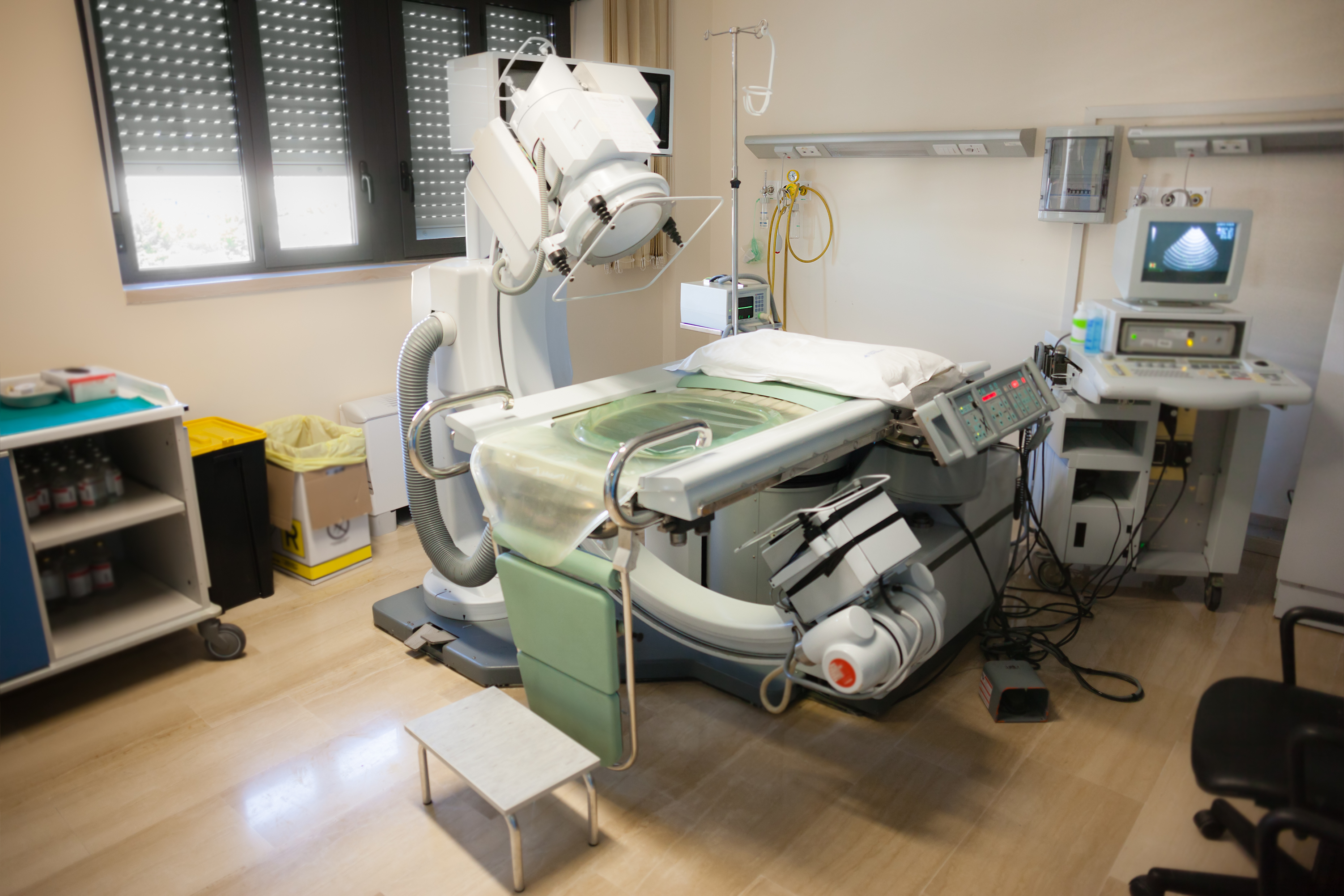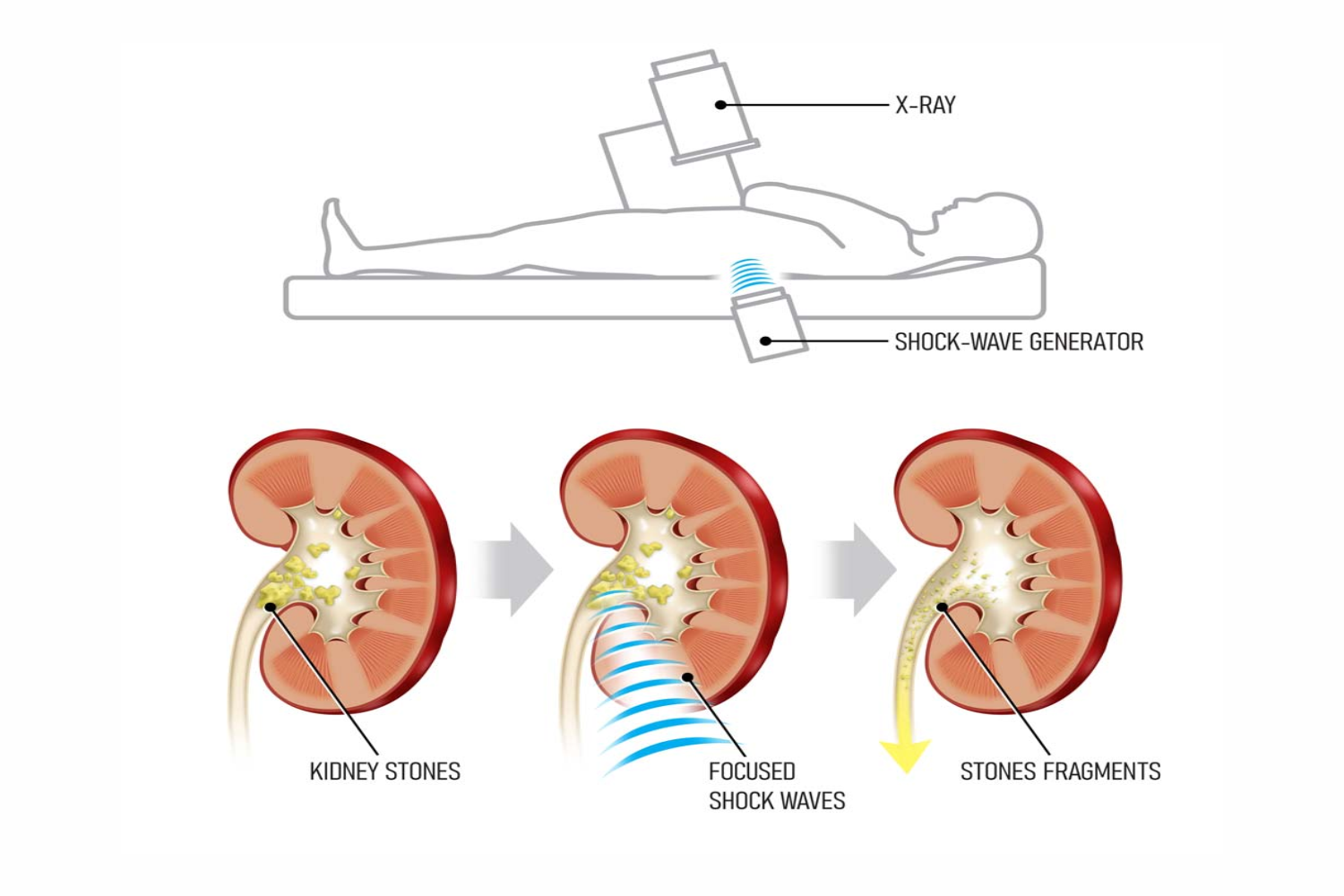What is Extracorporeal Shock Wave Lithotripsy
Extracorporeal Shock Wave Lithotripsy (ESWL) is a non-invasive medical procedure used to treat kidney stones, which are small, hard deposits of minerals and salts that form in the kidneys or urinary tract. ESWL uses high-energy shock waves to break up kidney stones into smaller pieces, which can then pass through the urinary system and be eliminated from the body.
During an ESWL procedure, the patient lies on a special table or platform while a machine sends shock waves through the body to the kidney stone. The shock waves are focused on the stone, which causes it to break up into smaller pieces. These smaller pieces can then pass through the urinary system and be eliminated from the body naturally.
ESWL is a safe and effective treatment option for most types of kidney stones, and it is typically performed on an outpatient basis with mild anesthesia. Patients may experience some discomfort or pain during the procedure, but this can be managed with pain medication.
The recovery period after ESWL is typically short, with most patients able to return to normal activities within a few days. Patients may experience some bruising or soreness in the treated area, and they may be advised to drink plenty of fluids to help flush out the kidney stone fragments.
At Z Urology in South Florida, our team of experienced urologists is dedicated to providing the highest quality care for our patients, including those who require treatment for kidney stones. If you are experiencing symptoms of kidney stones or have been diagnosed with a kidney stone, contact us today to schedule a consultation and learn more about how ESWL may be able to help you.
What is Stone Disease
 Stone disease, also known as urolithiasis or nephrolithiasis, is a condition where stones, also known as calculi, are formed in the urinary tract. These stones can develop anywhere in the urinary tract, including the kidneys, bladder, and ureters. The stones can be made up of different substances, including calcium, oxalate, uric acid, and cystine.
Stone disease, also known as urolithiasis or nephrolithiasis, is a condition where stones, also known as calculi, are formed in the urinary tract. These stones can develop anywhere in the urinary tract, including the kidneys, bladder, and ureters. The stones can be made up of different substances, including calcium, oxalate, uric acid, and cystine.
Kidney stones can be excruciating and can cause symptoms such as flank pain, blood in urine, nausea, and vomiting. The size and location of the stone can also affect the symptoms experienced. Smaller stones can sometimes pass on their own, while larger stones may require medical intervention.
Several risk factors are associated with stone disease, including dehydration, high salt intake, and a diet high in oxalate-rich foods. Certain medical conditions such as gout, urinary tract infections, and certain genetic disorders can also increase the risk of developing stones. Treatment options for stone disease can vary depending on the size and location of the stone, as well as the individual's overall health.
What is a Kidney Stone
A kidney stone is a hard, crystalline deposit inside the kidney or urinary tract. It comprises minerals and salts, and can vary in size and shape. Kidney stones can cause severe pain and discomfort when they pass through the urinary tract. If left untreated, they can also lead to complications such as urinary tract infections and kidney damage.
Kidney stones form when too many substances are in the urine, such as calcium, oxalate, and uric acid. When these substances become concentrated in the urine, they can form crystals that stick together and grow into solid stones. Dehydration, certain medical conditions, and some medications can increase the risk of developing kidney stones.
Symptoms of kidney stones include severe pain in the back, side, or lower abdomen, nausea and vomiting, and pain or burning during urination. Small kidney stones may pass through the urinary tract independently, but larger stones may require medical treatment. Treatment options may include medications to relieve pain and help the stone pass or surgical procedures to remove the stone or break it up into smaller pieces.
Types of Kidney Stones
There are several types of kidney stones, including:
Calcium stones
Calcium stones are the most common type of kidney stones, accounting for approximately 80% of all cases. They are usually composed of calcium oxalate or calcium phosphate. Calcium oxalate stones are more common than calcium phosphate stones and form when there is an excess of oxalate in the urine.
Oxalate is a naturally occurring substance found in many foods, including fruits, vegetables, and nuts. When there is too much oxalate in the urine, it can bind with calcium to form crystals that can eventually become stones. Calcium phosphate stones are less common and usually occur in people with a metabolic disorder or renal tubular acidosis.
Risk factors for calcium stones include a diet high in oxalate or salt, dehydration, family history, obesity, and certain medical conditions, such as hyperparathyroidism, inflammatory bowel disease, and urinary tract infections. Symptoms of calcium stones may include pain in the back, side, or abdomen, painful urination, and blood in the urine. Some people may experience no symptoms, and the stones may only be discovered during routine imaging tests.
Struvite stones
Struvite stones, also known as infection stones, are formed due to urinary tract infections caused by certain bacteria such as Proteus, Klebsiella, and Pseudomonas. These bacteria produce an enzyme called urease, which breaks down urea in urine, producing ammonium, which in turn leads to the formation of struvite stones. These stones are often large and can cause significant kidney damage if left untreated. Struvite stones are more common in women and can recur after treatment if the underlying infection is not properly addressed.
Symptoms of struvite stones are similar to those of other kidney stones, including severe pain in the back, side, or abdomen, nausea and vomiting, and difficulty passing urine. Diagnosis is made through imaging tests such as X-rays, CT scans, or ultrasounds. Treatment options for struvite stones include extracorporeal shockwave lithotripsy (ESWL), percutaneous nephrolithotomy (PCNL), and ureteroscopy with laser lithotripsy. Antibiotics are also prescribed to treat any underlying infections.
Uric acid stones
Uric acid stones are one of the most common kidney stones, accounting for approximately 10% of all kidney stones. These stones form when there is an excess of uric acid in the urine, which can happen due to various factors such as diet, genetics, and medical conditions like gout or chemotherapy.
Uric acid stones can be excruciating and may require medical intervention to pass. Symptoms of uric acid stones can include intense pain in the back or side, nausea, vomiting, and blood in the urine. To diagnose uric acid stones, a healthcare provider may order imaging tests such as X-rays or CT scans and urine and blood tests.
Cystine stones
Cystine Stones are a type of kidney stone composed of cystine, an amino acid found naturally in the body. These stones form when there is an excess of cystine in the urine, forming crystals that can accumulate and grow over time. Cystine stones are relatively rare, accounting for less than 1% of all kidney stones, but they can cause significant pain and discomfort for those who develop them. Because cystine is less soluble than other substances in the urine, it is more likely to form crystals and stones when urine becomes concentrated. People with a genetic condition known as cystinuria are at increased risk of developing cystine stones.
Mixed stones
Mixed stones, as the name suggests, are a combination of different kidney stones, typically calcium oxalate and uric acid stones. These stones can vary in size, shape, and composition, making them difficult to diagnose and treat. Mixed stones can be particularly problematic because they may require a combination of treatments depending on their composition. In some cases, surgical intervention may be necessary to remove the stones. Diagnosing and managing mixed stones are important for preventing complications such as kidney damage or infection.Determining the type of kidney stone is important to develop an effective treatment plan.
Signs and Symptoms of Kidney Stones
Here are some signs and symptoms of kidney stones:
- Sharp pain in the back, side, or lower abdomen
- Painful urination
- Cloudy or foul-smelling urine
- Blood in the urine
- Nausea and vomiting
- Difficulty urinating or frequent urination
- Fever and chills (if an infection is present)
- Pain that comes and goes in waves and varies in intensity
- Pain that worsens when you move or change positions
- Pain that may spread to the groin or genital area
- Pink, red, or brown urine
- Feeling the need to urinate urgently or frequently.
Extracorporeal Shock Wave Lithotripsy Procedure
 Extracorporeal Shock Wave Lithotripsy (ESWL) is a non-invasive medical procedure for kidney stones. Here is a detailed list of the steps involved in ESWL:
Extracorporeal Shock Wave Lithotripsy (ESWL) is a non-invasive medical procedure for kidney stones. Here is a detailed list of the steps involved in ESWL:
- Preparation: Before the procedure, the patient will be asked to drink plenty of fluids to help flush out the kidney stone fragments. Sometimes, a contrast dye may be injected into the patient's veins to help guide the shock waves to the kidney stone.
- Anesthesia: ESWL is typically performed under local anesthesia, which means that the patient will be awake during the procedure but will not feel any pain or discomfort.
- Positioning: The patient lies on a special table or platform that is designed to help position the kidney stone in the optimal location for treatment.
- Shock wave delivery: A machine sends high-energy shock waves through the patient's body to the kidney stone. The shock waves are focused on the stone, causing it to break up into smaller pieces.
- Monitoring: During the procedure, the healthcare provider will use imaging technology to monitor the progress of the treatment and ensure that the kidney stone is breaking up properly.
- Completion: The procedure is complete once the kidney stone has been broken up into smaller pieces. The patient may be asked to drink plenty of fluids to help flush out kidney stone fragments.
- Recovery: Patients can typically resume normal activities within a few days following ESWL. Some patients may experience bruising or soreness in the treated area, but this can be managed with pain medication.
ESWL is a safe and effective treatment option for most types of kidney stones. If you are experiencing symptoms of kidney stones or have been diagnosed with a kidney stone, contact Z Urology in South Florida today to schedule a consultation and learn more about how ESWL may be able to help you.
Recovery From Extracorporeal Shock Wave Lithotripsy
Recovery from Extracorporeal Shock Wave Lithotripsy (ESWL) is typically quick and straightforward. Here are some general steps involved in recovering from ESWL:
- Pain Management: Patients may experience some discomfort or pain after the ESWL procedure. Pain medication may be prescribed to help manage this.
- Hydration: Patients are advised to drink plenty of fluids after the ESWL procedure to help flush out kidney stone fragments from the body.
- Follow-up appointments: Patients will have follow-up appointments with their healthcare provider to monitor their recovery and ensure that the kidney stone has been completely eliminated.
- Rest and Recovery: Patients are advised to rest and avoid strenuous physical activity a few days following the procedure.
- Return to Normal Activities: Most patients are able to resume normal activities within a few days of the ESWL procedure. Patients should consult their healthcare provider before resuming any physical activity.
- Dietary Changes: In some cases, patients may be advised to make changes to their diet to reduce the risk of future kidney stones.
Patients must follow their healthcare provider's instructions carefully during recovery to ensure proper healing and elimination of kidney stone fragments. Patients should also report any unusual symptoms or discomfort to their healthcare provider right away.
Benefits of Extracorporeal Shock Wave Lithotripsy
Extracorporeal Shock Wave Lithotripsy (ESWL) is a non-invasive medical procedure for kidney stones. Here are some of the benefits of ESWL:
- Non-Invasive: ESWL is a non-invasive procedure, which means that there is no need for surgical incisions or anesthesia. This reduces the risk of complications and shortens the recovery time.
- High Success Rate: ESWL has a high success rate for treating kidney stones, with most patients experiencing complete stone clearance after a single treatment.
- Quick Treatment Time: ESWL is a relatively quick procedure, typically taking less than an hour to complete.
- Minimal Discomfort: Most patients experience minimal discomfort during the ESWL procedure. Any discomfort or pain can be managed with pain medication.
- Fast Recovery: The recovery time after ESWL is usually short, with most patients able to resume normal activities within a few days.
- Avoids Surgery: ESWL is an effective alternative to surgery for most types of kidney stones, allowing patients to avoid the risks and recovery time associated with surgical procedures.
- Fewer Complications: ESWL has fewer complications compared to surgical procedures, reducing the risk of infection, bleeding, and other complications.
At Z Urology in South Florida, our team of experienced urologists is dedicated to providing the highest quality care for our patients, including those requiring kidney stone treatment. If you are experiencing symptoms of kidney stones or have been diagnosed with a kidney stone, contact us today to schedule a consultation and learn more about how ESWL can help you.
Extracorporeal Shock Wave Lithotripsy at Z Urology
If you are experiencing symptoms of kidney stones, such as severe pain in the back or side, nausea, or vomiting, you may be a candidate for Extracorporeal Shock Wave Lithotripsy (ESWL). And regarding ESWL treatment in South Florida, Z Urology is a clear choice.
Our team of experienced urologists is dedicated to providing the highest quality care for our patients, using the latest technology and techniques to ensure that our patients receive the safest and most effective care possible. We will work closely with you to determine if ESWL is the right treatment option for you, and we will provide you with the information and support you need to make informed decisions about your care.
ESWL is a non-invasive, safe, and effective treatment option for most types of kidney stones, with a high success rate and minimal discomfort or downtime. At Z Urology, we are committed to providing our patients with the best possible outcomes and the highest level of care, from initial consultation to post-operative follow-up.
Don't let kidney stones hold you back any longer - contact Z Urology today to schedule a consultation and learn more about how ESWL may be able to help you. With our expert care and support, you can get back to living your life to the fullest.

 Stone disease, also known as urolithiasis or nephrolithiasis, is a condition where stones, also known as calculi, are formed in the urinary tract. These stones can develop anywhere in the urinary tract, including the kidneys, bladder, and ureters. The stones can be made up of different substances, including calcium, oxalate, uric acid, and cystine.
Stone disease, also known as urolithiasis or nephrolithiasis, is a condition where stones, also known as calculi, are formed in the urinary tract. These stones can develop anywhere in the urinary tract, including the kidneys, bladder, and ureters. The stones can be made up of different substances, including calcium, oxalate, uric acid, and cystine. Extracorporeal Shock Wave Lithotripsy (ESWL) is a non-invasive medical procedure for kidney stones. Here is a detailed list of the steps involved in ESWL:
Extracorporeal Shock Wave Lithotripsy (ESWL) is a non-invasive medical procedure for kidney stones. Here is a detailed list of the steps involved in ESWL:


